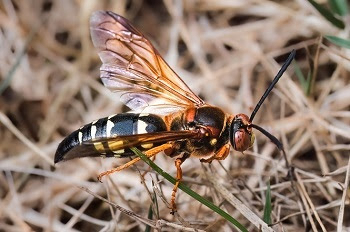Cicada killer wasps are nothing to fear

The soundtrack of the hot, hazy days of late summer – times of lazy summer vacations and cookouts with friends and family – for many Michiganders sounds like the drone of a cicada. But for one animal, the sound of a cicada means something very different: survival.
As cicadas emerge from the ground to call in the trees, another insect comes out as well – the cicada killer wasp. Measuring over an inch in length, these wasps are built to capture and subdue large adult cicadas. Only female wasps have stingers, which they use to inject venom into their prey and carry it back to their burrow.
Cicada killer wasps are solitary, and female wasps use their short time as adults to dig burrows where they stash the cicadas they catch and lay their eggs. While male wasps may be territorial or act aggressively, they lack a stinger and pose no danger to people; females sting only in self-defense. Just like the cicadas, cicada killer wasps die as summer wanes.
“You may see these wasps while you’re outside this year and immediately think of the stories of giant murder hornets invading North America,” said DNR game biologist Karen Cleveland. “Don’t worry. This secretive native insect has been here all along, and can be found silencing cicadas across the entire eastern U.S.”
Cleveland said that if you’re a good neighbor and respect the wasps’ space, they’ll be with us for a long time to come.
See more information about cicada killer wasps from Michigan State University Extension.






